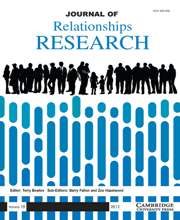Article contents
A Cross-Cultural Examination of the Experiences in Close Relationships — Revised — General Short Form (ECR-R-GSF) in an Australian and a Chinese Sample
Published online by Cambridge University Press: 27 June 2019
Abstract
Attachment dimensions refer to how interpersonal emotion regulation strategies are utilised and have a profound impact in adulthood. Its measurement has attracted a large amount of research attention. The Experiences in Close Relationships — Revised (ECR-R) Questionnaire is one of the most widely used and researched self-report questionnaires to measure romantic attachment anxiety and avoidance in multiple language groups, despite inconsistent evidence regarding its factorial structure. The 20-item Experiences in Close Relationships — Revised — General Short Form (ECR-R-GSF) was developed based on the ECR-R to measure attachment experiences in all relationships (not just romantic ones) in an English-speaking sample. However, no short form of the ECR-R is available for the Chinese population. In order to cross-validate the first Chinese version of the ECR-R-GSF, specifically the proposed two-factor structure, against the English version, an Australian university student sample (n = 426) and a Chinese university student sample from China (n = 626) were recruited. The Anxiety and Avoidance scales were found to have good internal reliability in both samples. However, the proposed two-factor model only provided an acceptable fit even after adding modifications in the Australian sample, and the fit was not satisfactory in the Chinese sample. Multigroup confirmatory factor analysis (CFA) indicated that partial metric but not scalar invariance was achieved across cultures. Implications for relationship and cross-cultural research and practice were discussed.
Keywords
- Type
- Research Article
- Information
- Copyright
- Copyright © The Author(s) 2019
References
- 4
- Cited by


